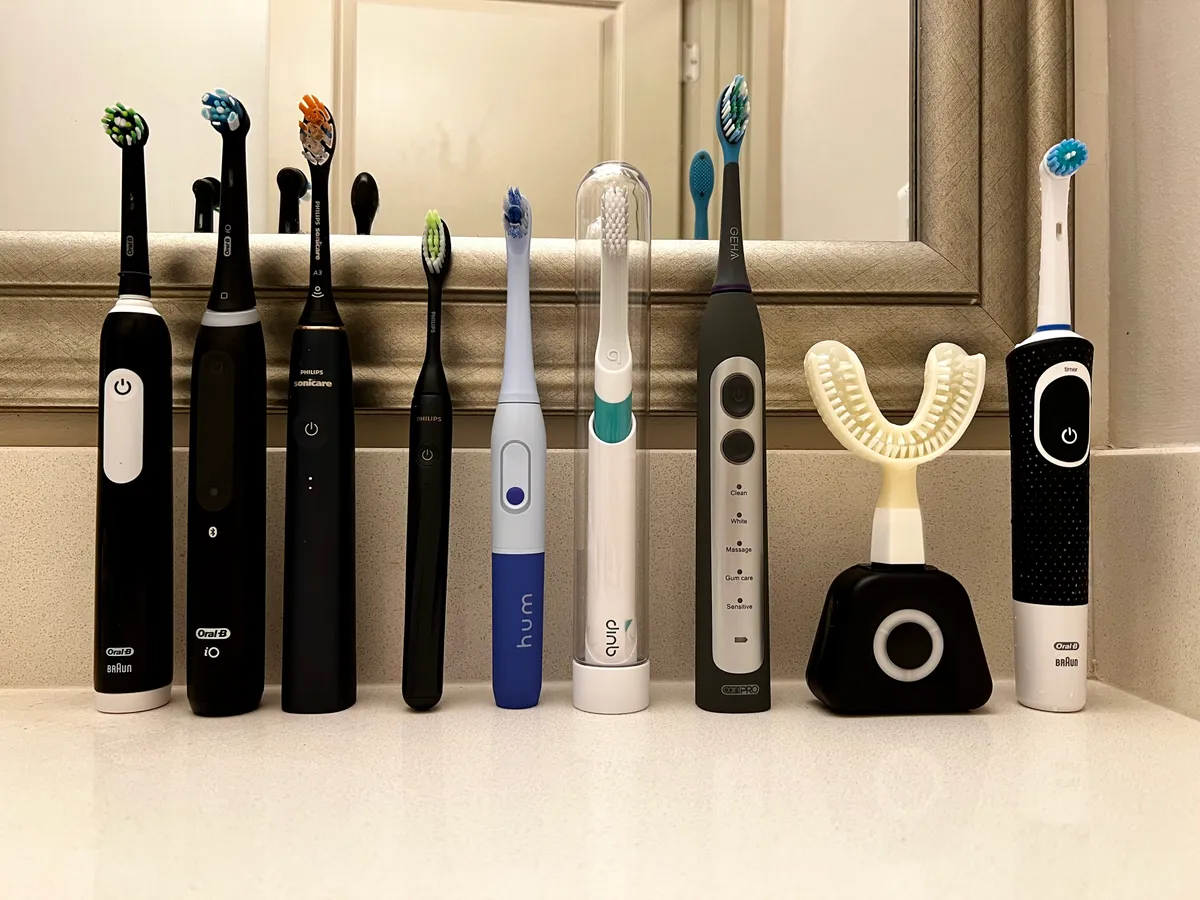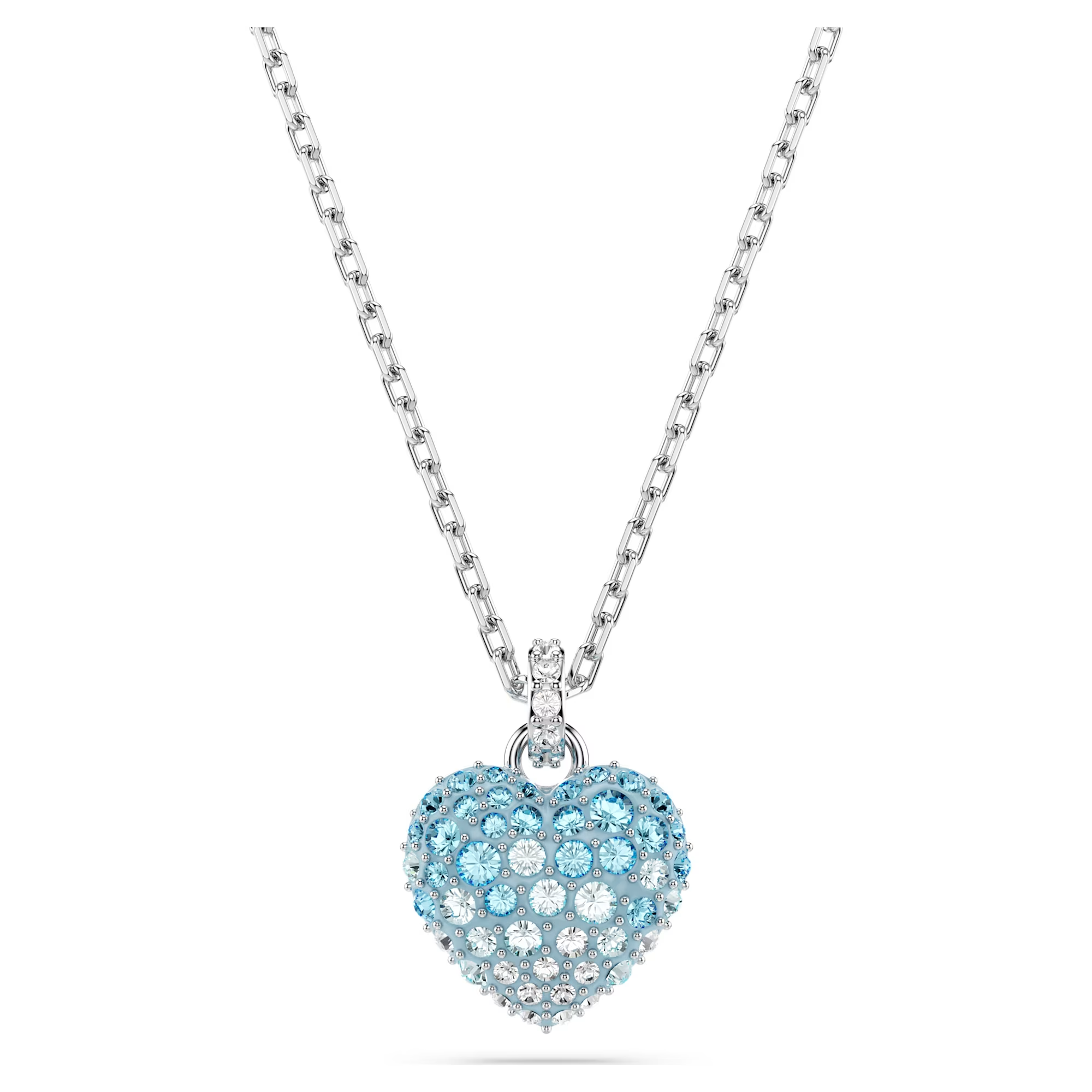Maintaining healthy teeth and gums is an important part of any good oral care routine. To follow the American Dental Association guidelines on how to best keep your teeth healthy, you should brush twice a day for 2 minutes each. Doing this with one of the best electric toothbrushes will keep your teeth about as clean as possible.
“Electric toothbrushes, particularly those with rotating or oscillating blades, can offer some benefits,” Dr. Jennifer Silver, a dentist in Calgary, Alberta, told CNET. “They can aid in proper scrubbing technique, reach hard-to-reach areas and provide controlled, consistent movements.”
Dr. Shahrooz Yazdani, CEO of Costello Family Dentistry in Ontario, agrees. “Electric toothbrushes are often deemed more effective because the motorized component can help bristles reach deeper gum pockets in the mouth more effectively,” he told CNET. To help find the right model for you, I tested 11 of the best electric toothbrushes on the market right now.
What is the best overall electric toothbrush?
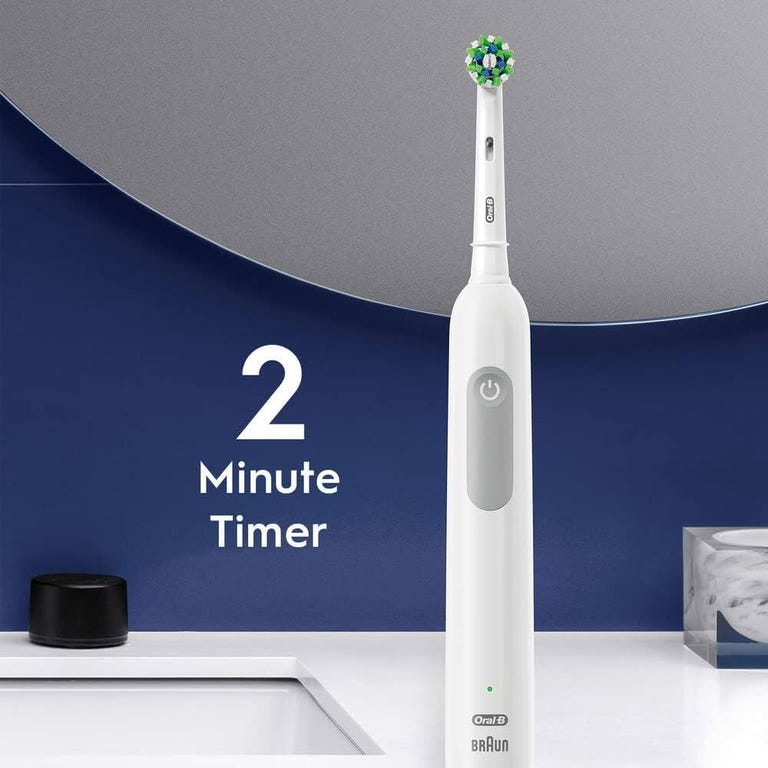
The Oral-B Pro 1000 made the top of my list due to its competitive price, cleaning power, brush timer, oscillating head and affordable replacement brush heads. It is also ADA-accepted — meaning that the American Dental Association has deemed the brush safe and effective.
I tested 10 other electric toothbrushes and five others made this list. You can also find the other electric brushes I tested in case one of those might fit you better. Here are my top picks for the best electric toothbrushes on the market.
I personally tested each electric toothbrush on this list and compared each against one another. During each trial period, I took into account design, functionality, price, brush size, travel ability, speed settings, modes and available technology. Overall, my experience brushing with each toothbrush once in the morning and once at night for as long as a week determined what products made this list.
Best electric toothbrush of 2024
The Oral-B Pro 1000 electric toothbrush is a powerful and functional product with a lower price tag that really stands out. It has one daily cleaning mode and a two-minute timer that signals you to move mouth quadrants every 30 seconds.
I tested the Oral-B Pro 1000 for a week, and it was my favorite product due to its simplicity and impressive cleaning abilities. I hardly had to scrub or brush my teeth on my own, the fast-spinning bristles did most of the work for me. It easily glided across my teeth. The smaller brush head also helped me to get to those hard-to-reach places. On top of that, the Oral-B Pro 1000 is ADA-accepted.
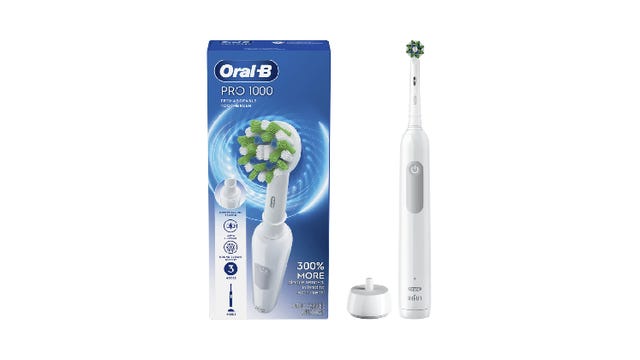
Best smart electric toothbrush
Oral-B iO Series 5
This Oral-B electric toothbrush is similar to other Oral-B brushes, except the bristles on this brush felt softer than the Oral-B Pro 1000. That’s a big bonus for anyone with sensitive gums, as is the real-time coaching that tells you if you’re brushing too hard. The Oral-B iO also has a quieter motor compared with the Pro 1000.
The display offers an impressive amount of information. Based on the lit-up icon, you can easily tell what mode you’re brushing in. The iO has five brush modes, whereas most electric toothbrushes seem to have three or four. You can choose from daily clean, intense clean, whitening, sensitive and super sensitive. The Oral-B iO Series is also ADA-accepted.
Best high-end electric toothbrush
Philips Sonicare 9900 Prestige
The Philips Sonicare 9900 Prestige is a lifesaver if you have sensitive gums like me. I sometimes brush too hard, and the Philips Sonicare buzzes and lights up when I press down too hard with the toothbrush — a gentle nudge to let me know to lighten the pressure. The brush also automatically adjusts intensity if you’re pushing too hard.
The Philips Sonicare 9900 Prestige has three different intensity modes and an app that shows your coverage. Similar to the app with the Oral-B iO Series, the display on your phone shows a 3D scan of your mouth and highlights the areas you are missing. The Sonicare app also guides you while brushing, and keeps track of your data, how much you are scrubbing (a big no-no with electric toothbrushes) and the pressure you are applying.
Another great feature of this brush is the reminders. If you have trouble remembering when to replace your brush heads, Philips’ BrushSync technology will tell you how long you’ve been using your brush head. A light on the handle will blink and the Sonic toothbrush will beep, letting you know it’s time to order a new one.
Best battery-powered electric toothbrush
Hum by Colgate
The Hum by Colgate won me over because it’s smart, but not too smart. This brush has three modes: normal, sensitive and deep clean, and it buzzes every 30 seconds to let you know when to move on to another quadrant of your mouth. The charger is small and easy to travel with — as is the carrying case, which fits two brush heads. Also, you can opt for a rechargeable brush if you get tired of replacing batteries.
One of the best features this brush offers is the guided brushing feature within the app, which tells you how good (or bad) a job you’re doing. It can be discouraging when your app tells you that you missed 20% of your mouth, but it offers encouragement and reminds you that you can earn rewards for brushing better. It might sound silly, but the experience really did make me want to brush better.
Best affordable electric toothbrush
Philips One Rechargeable by Sonicare
I found the Philips One Rechargeable to be the gentlest of all the brushes on this list, yet I still felt like my teeth were thoroughly cleaned with each use. I liked how small and lightweight it was.
The brush head is slimmer than the Philips Sonicare brush but still similar to a manual toothbrush. The bristles are soft and flexible and the handle is small and light — the perfect fit for the palm of your hand. It only has one cleaning mode and a two-minute timer that turns off the brush once you reach that mark.
The case it comes with is also one of the best parts of this brush. To store it, just flip the brush with its head down and pop into the case. The top flap closes and it is ready to go. I traveled with this brush on more than one occasion, and I specifically chose this brush to go with me due to its sleek design, quiet motor and the ease of slipping it into my bag.
Best electric toothbrush for kids
Oral-B Kid’s Color Changing Electric Toothbrush
The Oral-B Kid’s Color Changing Electric Toothbrush is my pick for the best electric toothbrush for kids. The handle feels small in my adult palm, so it’s a good fit for little hands. The toothbrush has two modes, comes in two colors and each box is equipped with stickers to decorate the waterproof handle.
The soft, round brush head oscillates back and forth to clear the teeth, and the brush itself is a lot smaller than the usual Oral-B brush head. The two-minute coaching timer helps kids learn how long to brush their teeth. Also, the bristles of the brush head change from blue to white when it’s time to replace the brush head.
Other electric toothbrushes tested
The electric toothbrushes in this section weren’t my favorites, but they do have some great qualities worth mentioning. One of these might be the right choice for you so it felt worthwhile to include them here.
Philips Sonicare for Kids Rechargeable Electric Toothbrush
For ages 3 and up, the Philips Sonicare for Kids is just as great as Philips’ other Sonicare models. The electric brush has two different modes and a brush timer and comes in two different colors. Plus, each box contains stickers to decorate the handle. It functions very similarly to the Oral-B Kid’s Electric Toothbrush, though the brush head vibrates instead of oscillating.
I did notice that the handle is heavier and about an inch longer than that of the Oral-B Kid’s Color Changing toothbrush. The brush head is a smaller version of the Philips Sonicare Prestige but is still almost three times longer than the Oral-B Kid’s brush head. However, what makes the Sonicare for Kids brush unique is that it has Bluetooth capabilities that connect to a smartphone app. I think the app is one of the best; it has educational videos and a tracking system that parents can use to see their kids’ brushing behavior.
Quip Electric Toothbrush
The Quip brush head is very close to the size of a manual toothbrush head. The Quip is simple in every aspect: It has one speed and a two-minute timer that buzzes every 30 seconds and turns off once the time is up. That’s it. There’s no app, charger or wires. This electric toothbrush is powered by an AAA battery located in the handle and the charge lasts three months.
I gave the Hum by Colgate the “best battery-powered electric toothbrush” title and not the Quip because I didn’t like the brush head of the toothbrush. Yes, it’s similar to a manual toothbrush but I found it hard to use to reach around my mouth. I also noticed that Quip’s motor isn’t very powerful compared with models from Sonicare or Oral-B. To me, it felt just like a manual cleaning. While I didn’t like that, others may not mind. If you’re looking for a smart electric toothbrush without Bluetooth or an app, the Quip may be the one.
CariPro Electric Toothbrush
The CariPro is a good brush, it just didn’t compare to the others on this list. The brush head vibrates and the top and bottom of the brush flare outward.
My gums and teeth felt sensitive after using the CariPro, but I do tend to experience dental sensitivity. It is hard to say if it was due to the brush bristles or the way the brush head flared out. If you have sensitive gums, note that the brush has five settings and one of which is a sensitive one. There’s some good in this, though: I feel like the CariPro did a good job of cleaning my mouth.
Y-Brush
The Y-Brush turned heads and piqued interest at CES in 2017 and came back to CES year after year. The strange, Y-shaped brush claims that it can brush all of your teeth in just 10 seconds. After applying toothpaste directly on the brush, the entire Y-Brush goes into your mouth. You then must bite down and press the button to activate the gentle vibrations. After five seconds, you can move to your lower set of teeth.
I not only found that the Y-Brush didn’t clean my teeth but the vibrations hurt my head. It was an uncomfortable experience that left my teeth just coated in toothpaste. The concept of this brush is fun and interesting. It might be for you if you are tired of ordinary electric toothbrushes.
Oral-B Pro 500 Precision Clean
My experience with the Oral-B Pro 500 Precision Clean brush compared with some others in the same price range. It has one cleaning mode and the brush head oscillates and rotates on a two-minute timer. The brush alerts you when you are finished. This simple Oral-B brush is basic and doesn’t have any special technology or paired apps.
Out of all the Oral-B brushes I tested with rotating spin heads, I liked this one the least. It wasn’t as powerful as the others and after a few uses, I found myself wondering if I needed a new brush head. I think this brush is perfect for someone testing out an electric toothbrush for the first time. It is simple and very reasonably priced. I, personally, would choose the Oral-B Pro 1000, but this Pro 500 is a good budget option.
How we tested the best electric toothbrushes
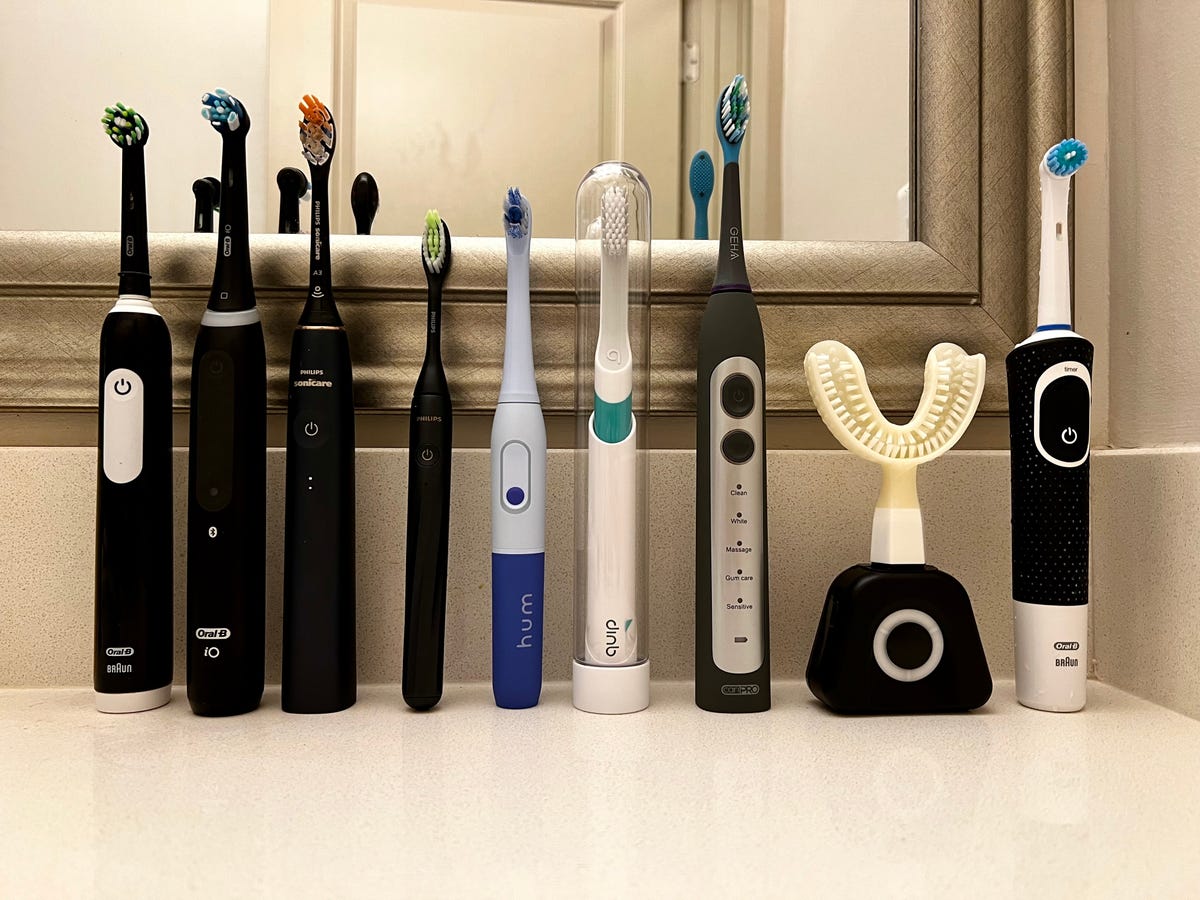
I personally tested each electric toothbrush on this list and compared each against one another. During each trial period, I took into account design, functionality, price, brush size, travel ability, speed settings, modes and available technology. Overall, my experience brushing with each toothbrush once in the morning and once at night for as long as a week determined what products made this list
Factors to consider when choosing an electric toothbrush
When looking for the best electric toothbrush, you’ll want to consider a few factors.
Cost
First things first. What’s your toothbrush budget? On the lower end, you can get a cheap electric toothbrush for $20 to $50, but it won’t have certain features such as a lithium-ion battery or a sensor.
A higher-ticket toothbrush in the $100-to-$200 range may have more features that may be worth it, but Dr. Yazdani suggests, “Pay more attention to the size and the type of bristles.” He adds, “More expensive does not always mean more efficient cleaning, as there are many affordable options that can do the job.”
Capabilities
What do you need the toothbrush to do? Maybe you just need one mode for cleaning a little deeper than you can with a manual toothbrush.
- Timer: If you need help brushing for the dentist-recommended two minutes, it’s a good idea to select a toothbrush with a built-in smart timer. It may buzz or stop brushing altogether after two minutes.
- Intensity levels: If you have sensitive teeth or sensitive gums, consider looking at the types of brush heads you can get for your electric toothbrush. Some models, like those from Oral-B or Sonicare, offer many different types of brush heads for different needs, such as brush heads for whitening, gum care and cleaning around braces. Some toothbrush heads have silicone bristles. It’s all about your preference.
- Smart features: If you want a toothbrush that does more than just clean your mouth in one setting, look for a toothbrush with multiple smart features. The Oral-B iO series, for example, has five brush modes: daily clean, intense clean, whitening, sensitive and super sensitive. That brush also pairs with an interactive app that helps you track how much of your mouth you’re cleaning. If you want to easily track your oral hygiene habits, go for a Bluetooth-enabled toothbrush with an app.
- Pressure sensors: If you have a habit of brushing your teeth a little too hard, it’s smart to find an electric toothbrush with pressure sensors. Froum says, “One of the more important features for an electric brush is a
pressure sensor that will shut the brush off if the person is brushing too hard.” It may buzz or turn red if you press too hard, and this can help you learn and keep from harming your teeth and gums.
ADA seal of acceptance
If a toothbrush is ADA-accepted, this means the dental product is safe, effective and of high quality. The Oral-B Pro 1000 and Oral-B iO Series from this list are both ADA-accepted.
Convenience
Are you going to remember to replace your brush heads when it’s time? If not, maybe a subscription-based electric toothbrush is right for you. Don’t forget to look into how long a toothbrush holds its charge. The last thing you want is for your toothbrush to be dead when you’re trying to get ready for bed; then you’d wish you had a regular toothbrush. Electric toothbrush vs. manual
Electric toothbrush vs. manual
The ADA also says that both electric and manual toothbrushes effectively remove plaque, but there are key differences.
Electric toothbrush
Pros:
- The elderly, children, or people with dexterity impairments or disabilities may find it easier to use.
- Can be better at hitting hard-to-reach spots.
- Built-in pressure sensors alert you when you’re brushing too hard.
Cons:
- More expensive
- Require batteries or charging
Manual toothbrush
Pros:
- Relatively cost-effective
- Very easy to find
Cons:
- You can brush too hard, damaging your teeth’s enamel.
- Easy to miss spots in your mouth.
- You can brush for less than two minutes if not paying attention.
Both electric and manual toothbrushes help you clean your teeth, avoid gingivitis and improve gum health. Regardless of which brush you choose, don’t forget to floss before brushing your teeth. “If you are unsure about the best option for your at-home oral health routine, consider consulting your dentist for advice,” says Dr. Yazdani.
Care and maintenance of electric toothbrushes
Caring for an electric toothbrush is different from caring for a manual one. Though both brushes require you to rinse off the head after each use, the head of electric toothbrushes should be detached and cleaned separately. Wipe it down and then wipe off the handle. Put the head back on the body of the brush and let it dry. Also, store your electric toothbrush standing up straight so it can dry between uses. Periodontist Scott H. Froum says, “storage of the device in a non-wet or humid environment is important.” A bathroom cabinet is a good place.
Dr. Silver also reminds patients, “Periodically, the toothbrush handle should be cleaned.” That said, one should be careful: “Avoid exposing or submerging the [entire] toothbrush [handle] in water, as it can damage the internal components,” she adds. Lastly, and most importantly, replace your electric brush head every three months. Replace it earlier if the bristles are fading or fraying.

